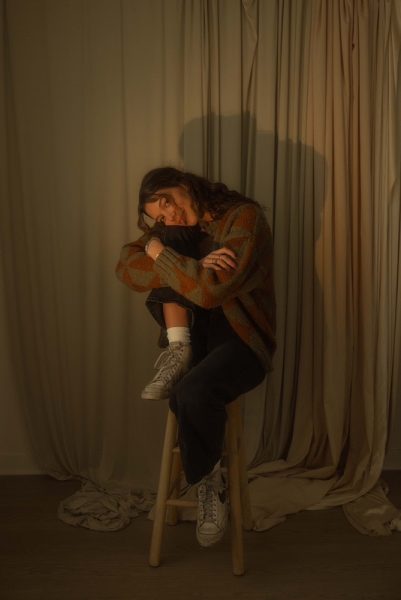Jackie Spinner does it all
Jackie Spinner is a total badass. A current assistant professor of journalism at Columbia College Chicago, Spinner spent 14 years reporting for the Washington Post as a combat journalist in Iraq and Afghanistan. She repeatedly risked her life for the sake of the story, and visited UNCW Sept. 28 to share her perilous experiences reporting on war.
During her lecture entitled “We’re Already There: Women Correspondents on the Front Line of Battle,” Spinner regaled the Morton auditorium audience with tales of riots and attempted abductions. She emphasized the importance of journalism and a writer’s responsibility to stay objective. As a journalist, Spinner believes she voluntary forfeited her right to speak her mind in exchange for telling the truth.
“Objectivity in a war zone means that I’m not representing a side,” said Spinner. “I’m a journalist first; then I’m an American.”
UNCW English lecturer Katie Peel admires her longtime friend’s dedication to journalism. During the lecture’s introduction, Peel gushed about Spinner’s toughness and compassion, as well as her dedication to offering people a voice.
“Jackie has lived for the story, sometimes dangerously so,” said Peel. “She has told stories that few others have sought out to tell. Jackie’s a rock star.”
Along with the lecture, Spinner was adamant in bringing “Conflict Zone” to UNCW, an exhibit displaying the most intimate aspects of war. The exhibit features photographs from some of the world’s greatest civilian and military combat journalists, and can be found in the Warwick Center Lobby.
Women’s Studies lecturer and LGTBQIA Program Coordinator Amy Schlag is just one of many professors who was blown away by the exhibit.
“We get to see a more complex view of war,” saidSchlag. “It shows you all these different angles; not just what you want to see or what you already know. It’s not trying to make anyone look good or bad. It just is. It’s what the war is.”
Peel and her young adult literature classes agree. She says her students got choked up at the exhibit while discussing the images and perspectives rarely seen by Americans.
“Overall, the two events combine to let students understand how complex the coverage of war is,” said Schlag, “and give them fuller appreciation for the work of journalists and a deeper understanding of Iraq and Afghanistan.”
After working in the Middle East for 14 years, Spinner continually returned to Iraq. She said journalists take people’s stories, and after taking for so many years, it was time to give back. In 2010, she spent a year giving back to The American University of Iraq by starting AUI-SVoice, Iraq’s first independent student newspaper.
“They always had the voice,” said Spinner, “I’m just teaching them how to use it.”
Spinner remains in contact with her Iraqi students, and has hope for their country because of their dedication to journalism. She continued giving back as a U.S Fulbright Scholar in Oman, where she founded Al Mir’ah, Sultan QaboosUniversity’s first independent student newspaper.
Of all her accomplishments, Spinner is most proud of these student newspapers. She created something for future journalists in Iraq, and found the experience addicting.
“I fell in love with teaching,” said Spinner. “It’s an amazing thing when you can teach a student what you’ve done and you give them advice and they end up better than you. I want them to be more successful than I am.”
Despite her love of teaching, Spinner insists she is first and foremost a writer.
“I love being a professor, but I’m a journalist who teaches,” she said.
Senior Lindsay Allen found inspiration in Spinner’s words. To Allen, Spinner’s apparent fearlessness was the most striking aspect of the lecture.
“She’s so brave,” said Allen. “I loved that [the lecture] was so applicable to all walks of life. That was so compelling and encouraging to me.”
After the lecture, students like Allen lined up to speak with Spinner about her memoir, “Tell Them I Didn’t Cry: A Young Journalist’s Story of Joy, Loss, and Survival in Iraq.” Although Spinner has been writing for the majority of her life, she found composing a memoir extremely difficult. She feels least comfortable when putting herself into a story. Despite the challenge, Spinner wrote her memoir with a continuing sense of objectivity and honesty.
“It seemed pointless to write my story if I weren’t going to write it fully and truthfully,” said Spinner. “I didn’t lose sight of the need to remain objective.”
As a thriving journalist, college professor, author, co-director of a revealing exhibit, and most recently, a mother, there are few things Spinner cannot accomplish.
“I go to war because I have a responsibility to tell peoples’ stories,” said Spinner. “Journalism is storytelling and I think it’s an amazing time for storytelling.”








